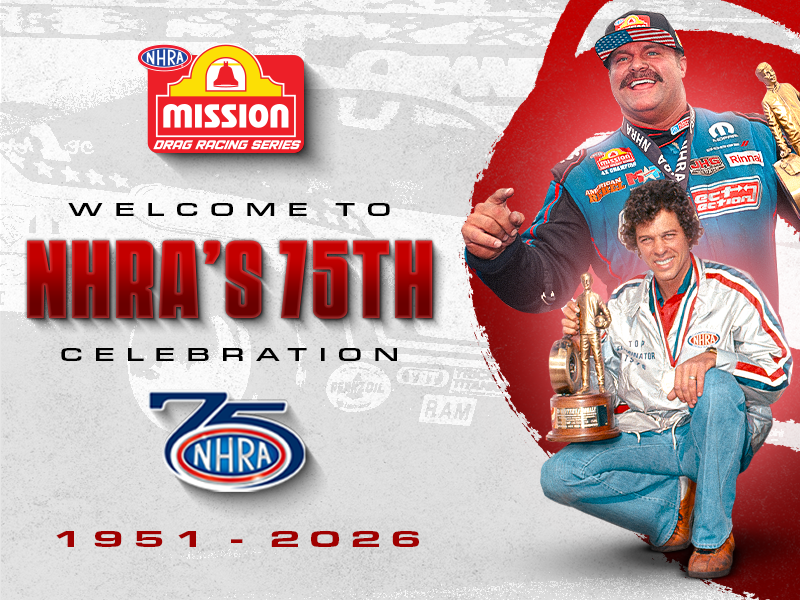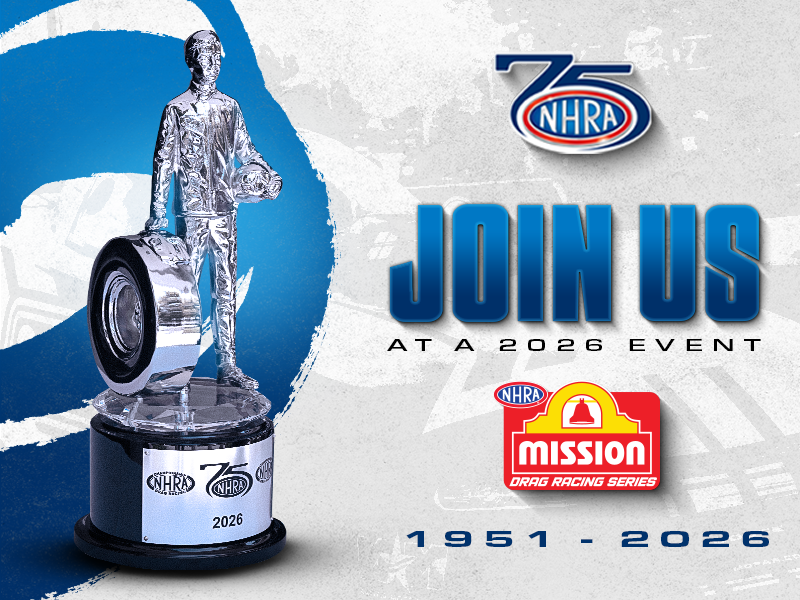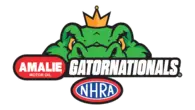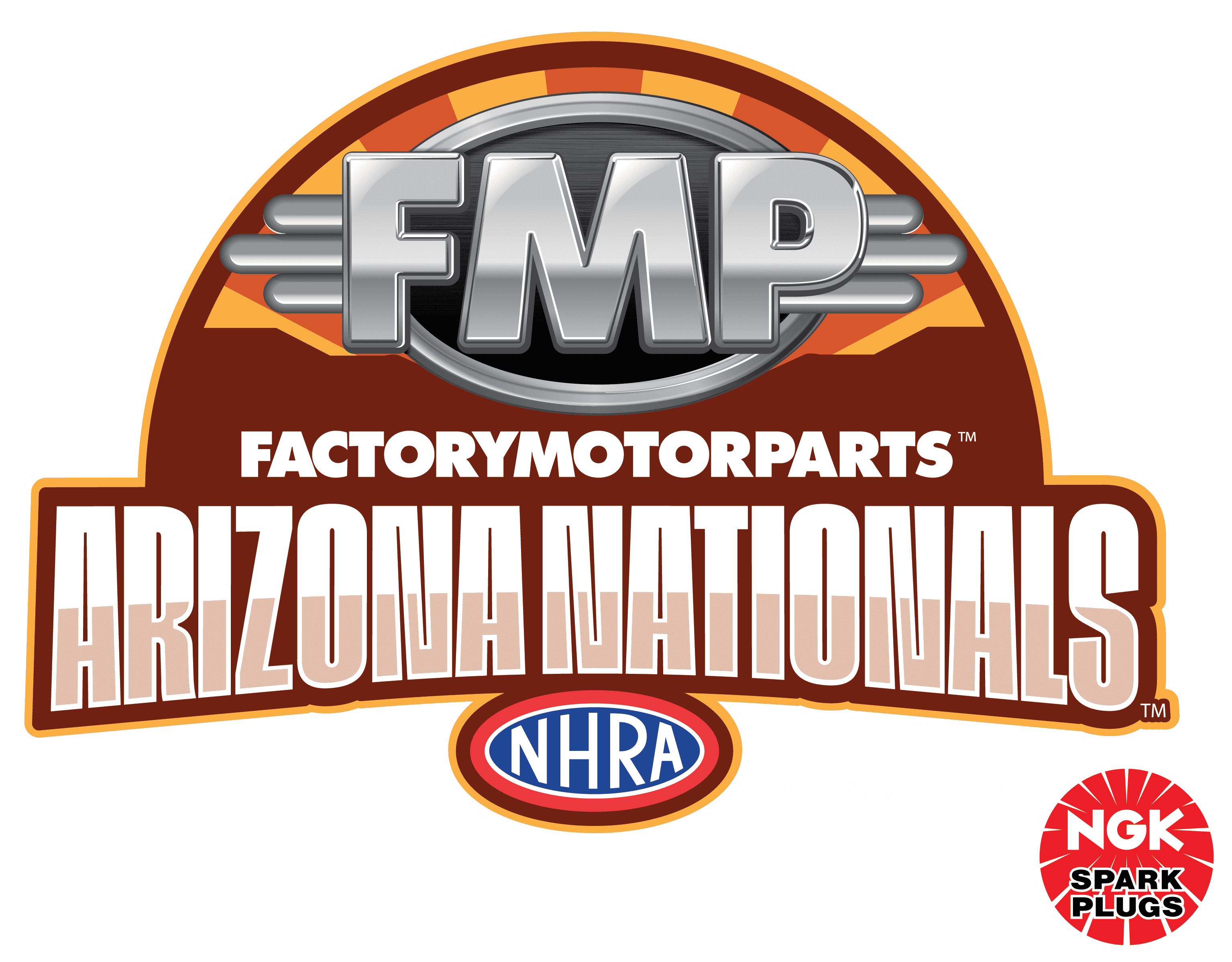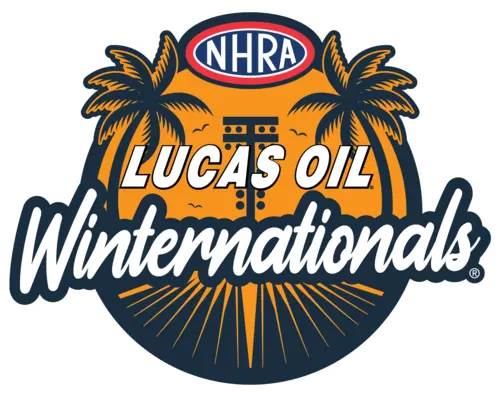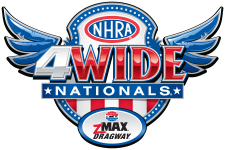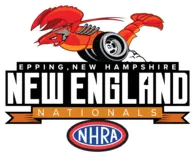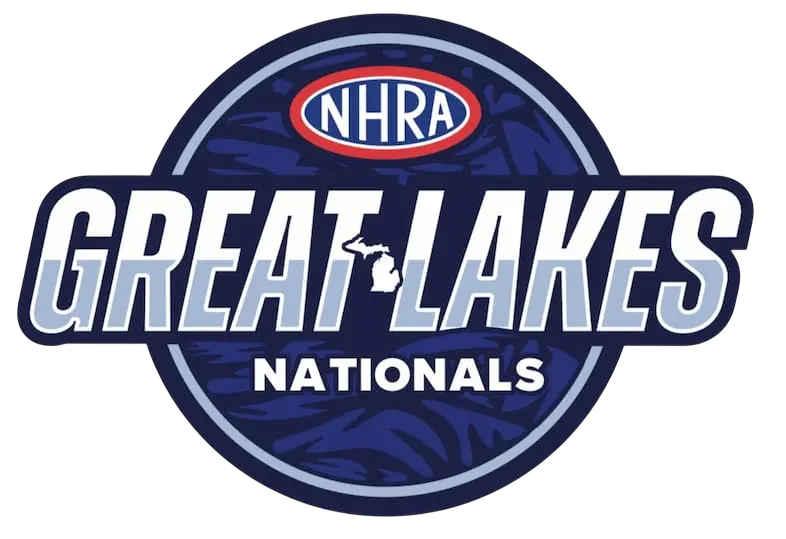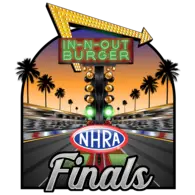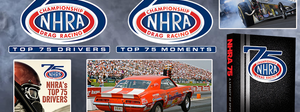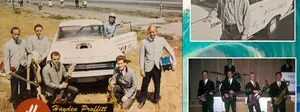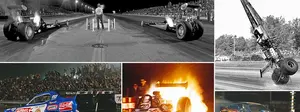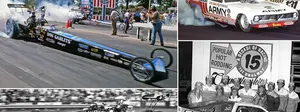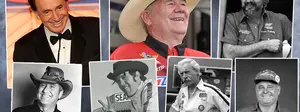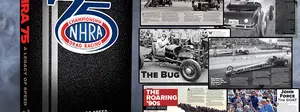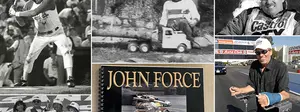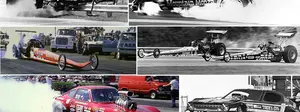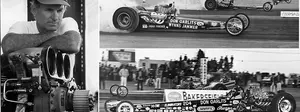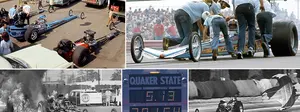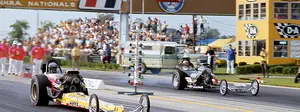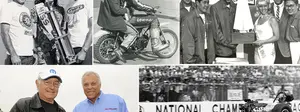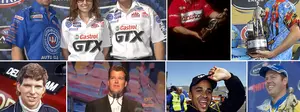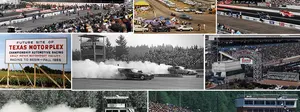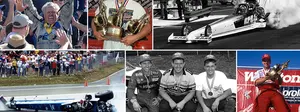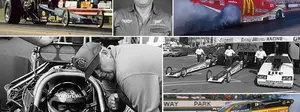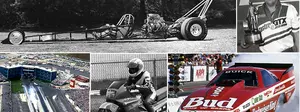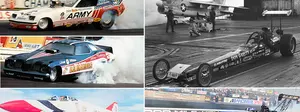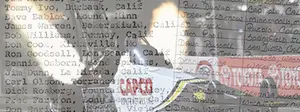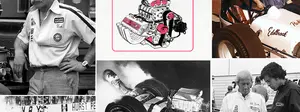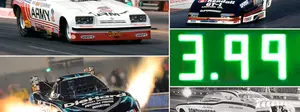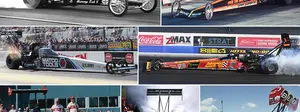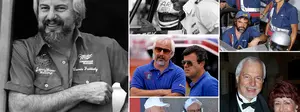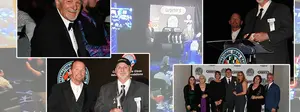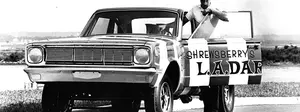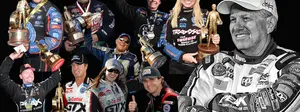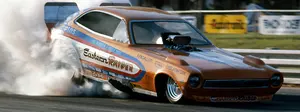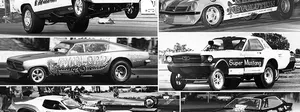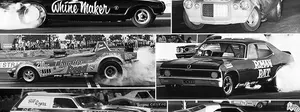Funny Car icon Bruce Larson: NHRA's original triple-threat Pro driver
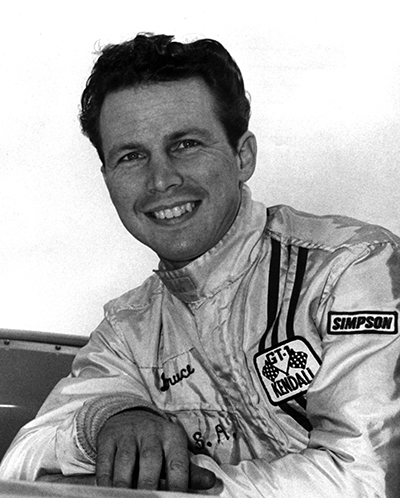
When Alex Laughlin, the new driver of Jim Dunn’s Funny Car, takes the green light for his class debut in qualifying at the Amalie Motor Oil NHRA Gatornationals, he’ll become just the second driver in NHRA history to have competed in Top Fuel, Funny Car, and Pro Stock at an NHRA national event, according to NHRA historian Bob Frey,
It's been more than three decades since this hot rod hat trick was first accomplished in 1992 by the subject of today’s column, drag racing legend Bruce Larson, who competed in Funny Car from 1966 through 1990 and Top Fuel from 1992-94, with a brief foray into Pro Stock in the early 1970s. When I tracked down Larson earlier this week, he was already aware of his place in NHRA trivia, and we spent a pleasant hour or so looking back over his amazing career.
The Pennsylvania Pro began racing at the famed airport dragstrip in Linden, N.J., in 1954 at what was just the fifth stop of the historic NHRA Drag Safari’s inaugural cross-country trek.
Larson was just 16 and driving a chopped and fenderless ’32 Ford five-window coupe he’d built (and still owns and drives daily).

“A friend of mine who was two years older than me had a real nice ‘41 Ford with a cam and heads and manifold, and I'd ride with him when he was street racing, and that got me hooked,” he remembers. “I bought the ‘32 Ford from a farmer. It was a V-8, and it ran. I played around with it for a little bit in the fields before I tore it apart, chopped it, and did all the necessary stuff.”
Larson later raced a ’54 Olds and a ’32 Chevy A/Gasser (that he also still owns), and as Larson’s mechanical skills and reputation continued to grow, it led to a job as a dyno operator/tuner for a local Ford dealership, which led to he and the owner’s son racing a lightweight Ford Galaxie for a time until the Sutliff Chevrolet dealership in Harrisburg, Pa., wooed him away for their own dyno ambitions and began Larson’s long, long association with the brand.

Ironically, it was while he was working at Sutliff that he met Jim Costilow, who had a hot little 289-powered Cobra that he'd been racing in hill-climb and road-racing events and wanted to further explore drag racing. Even though it was a Ford, Larson dynoed it for him at the Chevy dealership, and after Costilow proved not to be much of a drag race driver, Larson climbed into the seat.
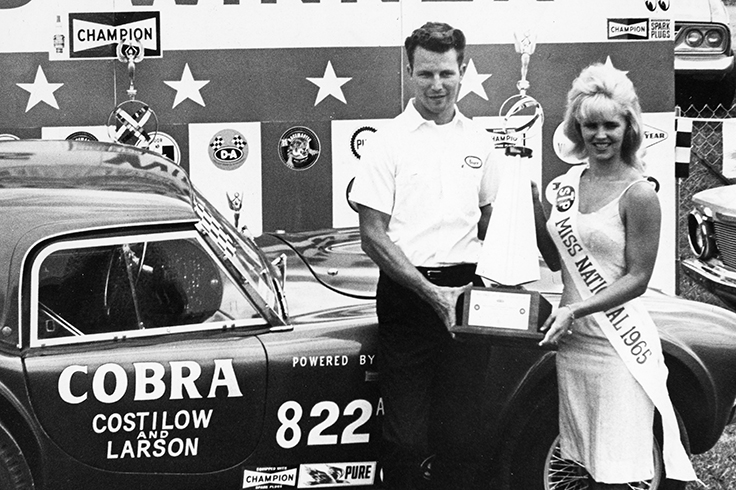
Larson and the Cobra were a perfect match as he won AA/SP class at the 1965 NHRA Winternationals, Springnationals, and Nationals and set both ends of the national record with the car.
“After about a year, Greg Sutliff, the dealership owner, came to me and said, ‘Don't you think we ought to be racing a Chevrolet?’ and when he said ‘we,’ I said ‘Yeah,’ so in late 1965, we built a 1966 Chevelle that was the first all-fiberglass Funny Car.”
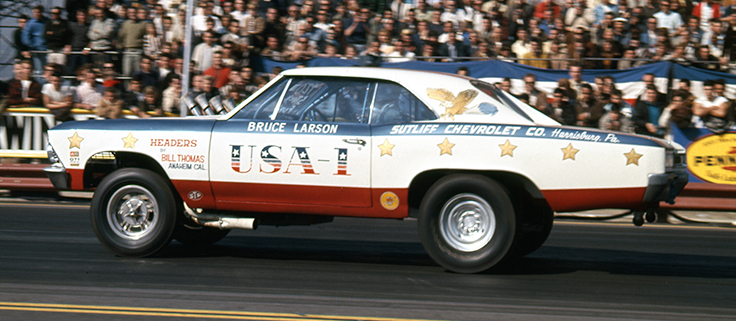
There’s always been some confusion about what constitutes a Funny Car with everyone from Jimmy Nix and Jim Johnson to Dick Landy having altered wheelbased, blown nitro-burning door cars that are considered the godfathers to what we know as Funny Cars today, but even though it wasn’t a flip-top body, Larson’s was the first that was all fiberglass. (Fearful of fire, Larson wanted something with a door for easy emergency egress, and his first two flip-tops also had working side doors!)
The injected, 454-powered Chevelle, which debuted on alcohol but was quickly switched to nitro, was also the first red, white, and blue car that carried what became Larson’s trademark USA-1 name.
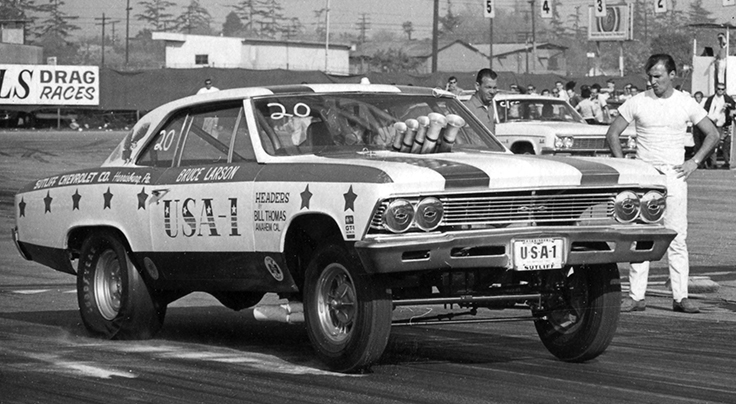
“We heard in late 1965 that Chevrolet was going to use USA-1 as an advertising slogan — meaning No. 1 in sales in the USA, I guess — and it just sounded awful catchy, and I adopted it,” he explained. “Chevrolet never complained about it — Chevrolet didn't ever give me much help either – and I eventually copyrighted, so it's mine now.”
Larson ran the car with much success and fanfare, then sold it to Jim Maybeck, which became his Screamin’ Eagle car, and Larson got the first of a series of flip-top Chevrolets that included Camaros, Monzas, and Corvettes.

The '68 Logghe-chassised Camaro catapulted Larson to the quickest run in class history at the time, a 7.41, and he won the prestigious Super Stock Nationals in York, Pa., in the ’69 car.
Throughout the 1970s and early 1980s, Larson was primarily a match racer. He would run select national events now and then, but his bread and butter was up and down the East Coast, where track operators were thrilled to book his USA-1 Chevys.
“With match racing, I actually could make a living, which I couldn't do on the NHRA circuit,” he said of the era’s paltry purses. “It would have been able to just cost me money. Plus for a while I was still working at the Chevrolet dealership, and my family’s lightning protection business [lightning rods] that had been passed down from my grandfather to my father and then me, but even when I got into the [national event] ranks, I flew back and forth and kept the business going.”

Larson stayed with Chevrolet engines in his Funny Cars until 1972 when breakage started to become an issue, and, ironically, it was the switch to a Chrysler powerplant that led to him leaving the class for a few years.
“I had a ‘72 Mini-Camaro that started out with a Chevrolet engine, but I just couldn't keep going with the Chevrolet anymore, because there weren't any aluminum [versions],” he said. “I could run with the Hemis, but I was destroying things, so I put my first Hemi in that car. Not long after that, I was running at Budds Creek [Maryland Int’l Raceway] and broke the crankshaft and had a big fire in the traps. That was a scary deal and put me in Pro Stock.”
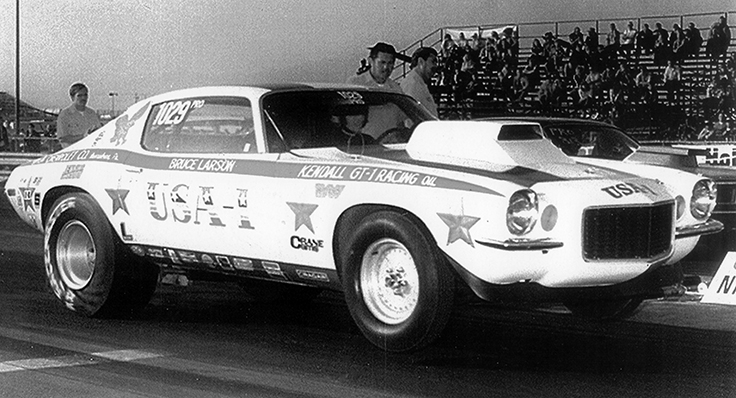
Larson borrowed a Camaro from fellow Pennsylvanian Bill “Grumpy” Jenkins and later had his own Vegas, and he ran in Pro Stock through the end of the 1974 season, earning his license in the second of three classes he’d eventually run. He only ran five NHRA national events in Pro Stock — he qualified for three but never won a round — but again match-raced extensively with a big-inch Jenkins engine.
“The fire really scared me, and I saw what Jenkins was going with his Vega, and I thought, ‘It looks like he's having fun.’ I ordered an SRD car, but I borrowed his Camaro that was in storage and painted it with my colors and ran his mountain motors, and had a great time. [Ronnie] Sox and [Don] Nicholson and those guys were running pretty close to stock engines so that they could compete in NHRA, but when they'd go out match racing, I could run away from them with Jenkins’ mountain motors.
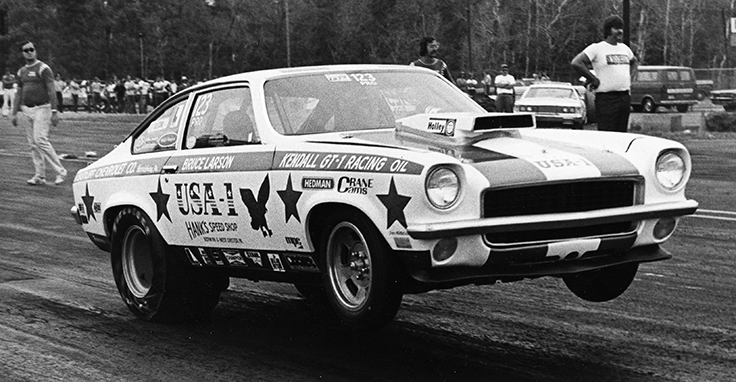
“I have the utmost respect for the Pro Stock class and drivers and everything, but they were harder to work on — I didn't like trying to tune Jenkins' three-link rear suspension on the SRD car, which is why I switched to a [Don] Hardy car for 1974 — they didn't smell right, and they didn't make enough noise, and they didn't go fast enough.”
Larson returned to Funny Car and bought a lightly used Monza from “Jungle Jim” Liberman (that car later became Chuck Etchells’ first nitro car). Larson continued to compete in Funny Car, still primarily on the match-race circuit, but never stopped pitching sponsors for his dream of running the NHRA national event circuit.
“I had been soliciting sponsorships for years, just like a whole lot of guys had,” he said. “I spent a lot of money, made a lot of formal presentations and all that, but a friend of mine, Bill Corwin, who worked for [longtime backer] Kendall Oil, whose next-door neighbor that worked for a printing company that did the printing for that Datcom Instrument Company, and they wanted to get into Funny Cars, and so I was lucky. I was their choice.”
In 1985, Larson teamed with another fellow Pennsylvanian and still relatively new Top Fuel driver Joe Amato and raced with his first major sponsor, Sentry Performance Tachs & Gauges. The fact that Amato owned a huge performance wholesale business — into which Larson was able to get Sentry added to the product line — didn’t hurt, nor did the fact that Amato had one of the era’s best crew chiefs, Tim Richards, calling the shots.
By this time, Larson had already hired his own crew chief, Maynard Yingst, who was a bit of an unconventional choice, to say the least.
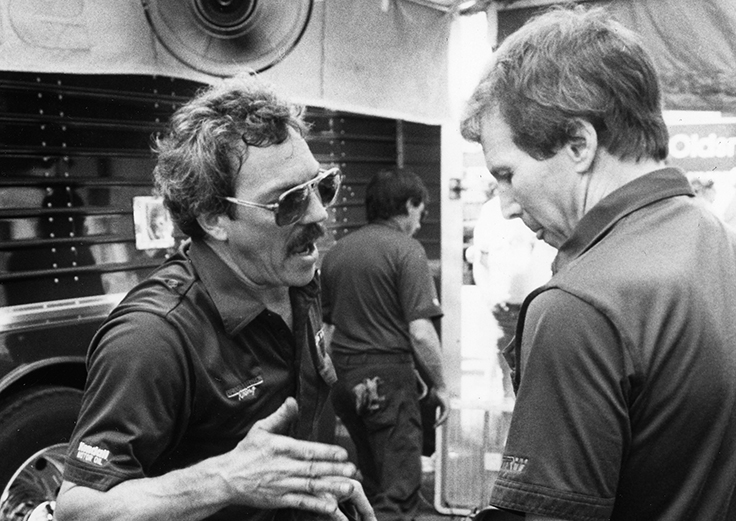
“He was a sprint car driver who had lost his ride,” Larson explained. ”He used to hang around my shop a little bit, and I’d go to the sprint car races, so we were acquaintances, but he caught on real quick. It was amazing. I said, ‘I'll teach you everything I can,’ and I did, and Maynard and Tim got along very, very well, so it was a storybook deal.”
“The Sentry deal wasn't a real big deal — it was about an eighth of what [Kenny] Bernstein had — but I knew I had to beat Bernstein, so I went to Mike Kase, who built Bernstein's cars, and bought the same chassis. That was my attack at getting started on the right foot.”
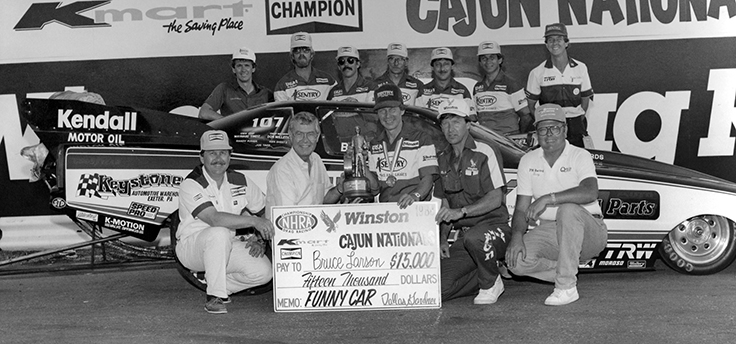
Larson and Yingst didn’t crack the Top 10 of points until 1988, when they finished sixth, thanks largely to Larson’s first national event win, which came at the NHRA Cajun Nationals, but no one could have predicted what was in store for 1989.
Larson won the 1989 season-opening Winternationals in Pomona and never looked back, also scoring wins in Columbus, Denver, Seattle, and back-to-back wins at the season’s final two events, in Phoenix and back in Pomona. He led the points the entire season en route to his first (and only) world championship. So strong was Larson’s season that he finished more than 15 rounds ahead of the second-place driver, Don Prudhomme, who was competing in Funny Car for the last time before returning to his Top Fuel roots in 1990.

“It gets back to a good crew chief — actually two good crew chiefs — and a little bit of money,” he said. “They gave me a good ride. I guess I did my part in the seat. The end of the season was really neat because I clinched the championship racing against Prudhomme in the final at Phoenix and then went to Pomona and beat [John Force] in the final there, so it was a sweet way to end the season.”
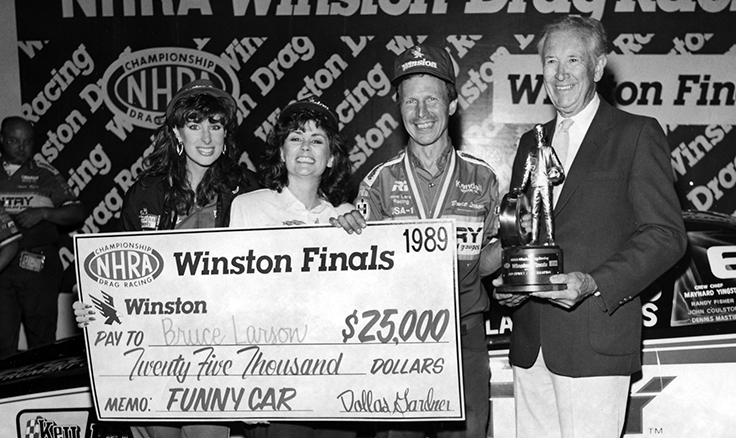
Larson’s championship defense in 1990 was hobbled almost before it began when Datcom was sold and the new owners weren’t interested in sponsoring a Funny Car, even a defending world champion.
“I had signed a contract for 1990 for just a little bit more money and then all of a sudden [the new owners] knocked me right out,” he recalled. “The president of the company was really on my side, and he went to bat for me, and he got me half the budget that I had in ’89, and we struggled but still came in third in 1990. A lot of people like to be able to do that. But that wasn't good enough, and I wasn't going to spend any more personal money, so I stopped racing.”
Larson wasn’t on the sidelines long, and his next ride shocked everyone, including himself. Legendary figure “Big Daddy” Don Garlits had been forced to retire from driving early in the 1992 season after suffering detached retinas during a high-G double-parachute stop and asked Larson to take over the controls of his new monowing Swamp Rat 32 Top Fueler.
“He talked to Andy Maurey, who was the racing director for Kendall, and I think Andy put in a plug for me,” Larson said. “Of course, Don and I knew each other a little bit as we both had been sponsored by Kendall for many years.

“I went down to Ocala [Fla.] and got fitted in the seat, and we took the car up to Gainesville to test, and Don said, ‘Drive it out about 300 feet and then back up, and we’ll talk.' He put the canopy down over me, and it was totally quiet in there. I made a burnout and a little squirt, and there was no clutch dust, no noise, no nothing. I backed up, and I was kind of laughing when he opened the canopy and asked, ‘What's the matter?’ I hate to say what I said to him, but, anyhow, they're awfully nice to drive. I mean, you aim them and they go straight to the finish line. They're a lot easier to drive than a Funny Car and safer, but a Funny Car is more fun.”
Even though they had a pre-Steve Torrence Richard Hogan helping out Garlits on the tuning side, they didn’t have a lot of fun, success-wise, on the NHRA circuit, qualifying just five times in 13 races and winning just one round, but they did win four IHRA races together in Top Fuel through the end of 1994.
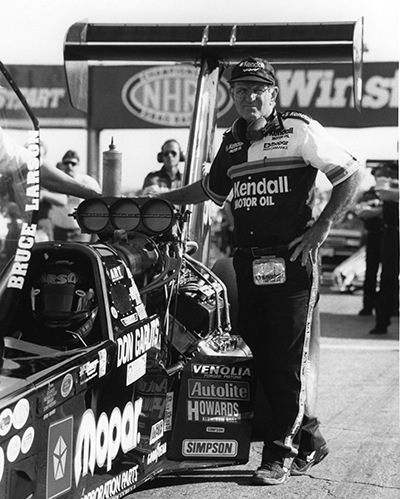
So, Bruce, what was it like to not only be in a new class, but driving as a hired driver for one of the biggest names in the sport, and a guy used to success?
“He made it easy,” said Larson. “He let me do my thing driving, and he and Richard did the tuning. I wish Richard had known as much then as he knows now. We stayed mostly around the IHRA circuit and usually couldn't even qualify at NHRA events. He built the Swamp Rat 34 for me the second year to fit me better and had some other ideas for that car, but eventually, I think Don got tired of not driving, and just decided, in 1994, that we just were not going to do it anymore, and so he parked it." (If you’re wondering about the jump from SR32 to SR34, that’s because SR33 was a supercharged flathead-powered salt flats streamliner that Garlits built and carried him to a speed of 217.947 mph at Bonneville in August 1988 to earn him a spot in the prestigious 200-mph Club.)
That ended Larson’s professional driving career but not his racing.
Larson’s NHRA National Event Scorecard |
|||
Class |
Events |
Qualified |
W-L record |
Funny Car |
86 |
73 |
108-66 |
Top Fuel |
13 |
5 |
1-5 |
Pro Stock |
5 |
3 |
0-3 |
Total |
104 |
81 |
109-74 |
“I got into nostalgia match racing, and we had a replica of the under ‘68 Camaro built just a few years ago and match raced a lot against the Frantic Ford,” he said. “The next year, I got a replica of that ‘72 car because the original cars weren't really safe enough, and we had a great time.
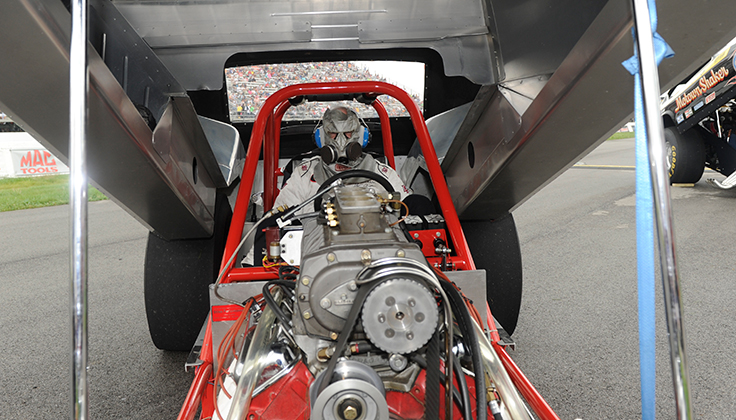
“I have some cackle cars — the ‘68 Camaro, which was the original Logghe the car; the 79 Corvette, which is a Pat Foster car and unrestored but real good cackle car; and I also have a twin-engine blown flathead dragster injected flathead and a single-engine flathead dragster. They're all good cackle cars.
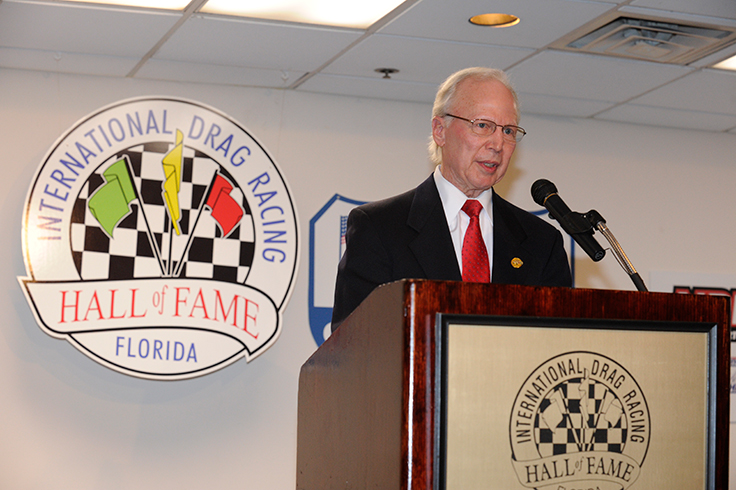
Larson’s list of accolades is long and deep, including installation in Garlits’ International Drag Racing Hall of Fame, the Motorsports Hall of Fame of America, the Pennsylvania Sports Hall of Fame, the Super Stock Magazine Drag Racing Hall of Fame, the Eastern Motorsports Press Association Hall of Fame, the East Coast Drag Times Hall of Fame, and the NHRA Northeast Division Hall of Fame. He’s won the “Jungle Jim” Liberman Memorial Award, the ’89 Car Craft Magazine Driver of the Year, the ’89 Eastern Motorsports Press Association Driver of the Year, the Al Holbert Memorial Award, and was named the ’89 NHRA Northeast Division Driver of the Year.

Additionally, three of Larson's cars are installed in museums across the country. The 1989 championship car was donated to the Smithsonian Institute (currently in storage there, alongside Garlits Swamp Rat xxx) while Larson's original Chevelle has a permanent spot in Garlits’ Florida museum, and Swamp Rat 32, with Larson’s name on it, is still mounted to the wall at the Wally Parks NHRA Motorsports Museum in Pomona.
Quite a career, I’d say.
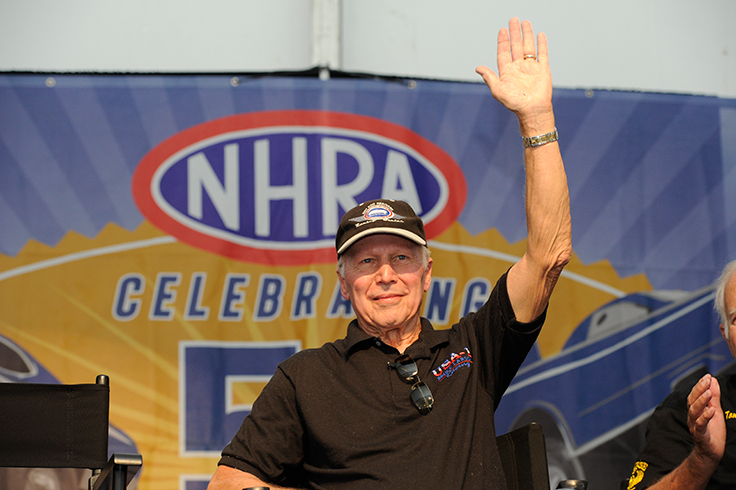
“When you first called me, I thought, ‘You know, it's been a whirlwind career, and then I thought, ‘Well, it's been a 70-year, whirlwind career,” Larson told me. “It's really, truly been gratifying. I loved drag racing.
“It was always about the challenge. Driving was part of the challenge, but the tuning and performance and building of the cars is the biggest challenge as far as I'm concerned because there's always something I tried to figure out to beat the next guy.”
Phil Burgess can be reached at pburgess@nhra.com
Hundreds of more articles like this can be found in the DRAGSTER INSIDER COLUMN ARCHIVE
Or try the Random Dragster Insider story generator



